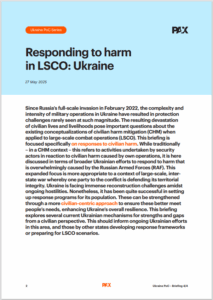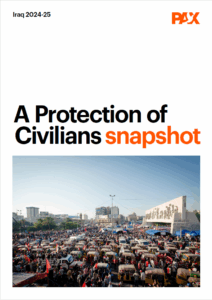Larger budget for armed forces should include fund for civilian harm
The cabinet should invest in a civilian harm fund, argue PAX Erin Bijl and Jip van Dort in an opinion editorial in Dutch newspaper Parool on 13 September. “Compensation is an acknowledgment of suffering.”
In the new defense policy, which will be discussed in the House of Representatives on Wednesday, the cabinet explains how no less than five billion euros is added to the budget of the armed forces every year – the largest investment since the end of the Cold War. A small portion of this should be set aside for a civilian harm fund.
During the night of 2 to 3 June 2015, at least 85 civilians were killed in a Dutch airstrike in Hawija (Iraq). Hundreds of people were injured, the devastation was enormous. In the same war against Islamic State, another four civilians were killed in Mosul a few months later. Civilians were also victims of Dutch use of violence in previous wars, for example in Chora (Afghanistan, June 2007) and during the Kosovo war in 1999.
Painful reality
Such examples illustrate a reality as painful as it is inevitable. Weapons are becoming increasingly accurate and sometimes the impression is created that civilian casualties can be prevented, but in practice this is often not reflected. Certainly not when there is bombing in urban areas, such as in the war against IS. In the future, too, we must take into account civilian casualties as a result of Dutch use of force.
In the past, the Netherlands sometimes paid compensation – so-called ex gratia payments – on a voluntary basis to victims or their next of kin, for example during the military operation in Uruzgan. It is reported that up to 2009 about $475,000 was paid to Afghan citizens. In September 2020, media reported that just under a million euros had been paid to the lone survivor of the attack on Mosul mentioned above. Such payments recognize that – even when action has been taken in line with the laws of war – civilians have been harmed intentionally or unintentionally, for which they will be compensated.
Ad hoc
More than four million euros has been set aside for the community in Hawija for some repairs, but these do not concern individual payments. This is to the great dismay of the victims and surviving relatives, according to research by PAX in collaboration with Utrecht University and the Iraqi NGO Al-Ghad. As far as is known, the Kosovo war did not lead to ex gratia or other payments.
Victims of Dutch violence cannot automatically count on a financial gesture. The policy has a rather ad hoc character. That can and should be done better. A civilian casualty fund, which already exists in the United States, is a step forward. A moral motive for such a fund is that we are responsible for our own actions. This responsibility must also be taken when civilians become victims. It is a gesture of goodwill to accommodate victims and an acknowledgment of their suffering.
A humanitarian motive is that civilians in war should be spared as much as possible. Sometimes families suddenly lose their main source of income or breadwinner, a house is destroyed or enormous medical costs have to be incurred. For example, our research into Hawija shows that many victims still need medical care for injuries from that time. There is often a lack of financial resources for these treatments. Compensation may not eliminate the damage, but it can mitigate it. Suffering is also alleviated.
Always reasonable
There is also another strategic reason. To be able to conduct military operations successfully, support among the population is sometimes necessary. If there are civilian casualties, the legitimacy of the military presence is undermined. It creates enmity.
Minister Ollongren (Defence) recently replied to questions from the House of Representatives that "The Netherlands can decide to voluntarily proceed to compensation if this is reasonable." We believe this is always reasonable.
Civilian victims and surviving relatives deserve support in the event of loss of life, injuries and material damage. This can be done by setting up a fund that is supplemented annually with a fixed, sufficient amount. Especially now that extra investments are being made in weapons and military strength, it is important not to ignore the dark side of armed intervention.
Erin Bijl is a project officer at PAX, where she focuses on civil protection.
Jip van Dort is a political advisor at PAX, affiliated with the Intimacies of Remote Warfare program at Utrecht University and one of the authors of Hawija; The devastating reality of our long-range war against ISIS.
This article is published in Dutch newspaper 'Het Parool'.
About this news
Date of publication:
Sep 19, 2022
Author:
Erin Bijl & Jip van Doort (PAX)
Publisher:
PAX
Extra:
This article is published in Dutch newspaper 'Het Parool'.
Read the full article on Parool.nl
